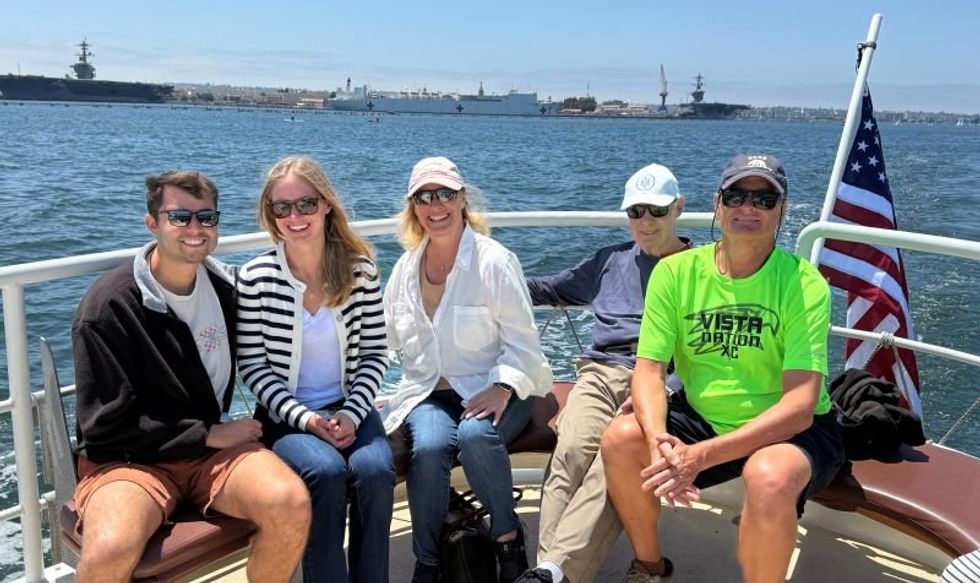As told to Erica Rimlinger
“I’m fine. I just didn’t eat enough breakfast,” I told the medical staff in the emergency room. I was gearing up to walk out of the hospital. My co-workers, I explained, were being overly cautious by ordering the ambulance for me. They told the EMTs I passed out, fell and hit a desk on the way down. I didn’t remember that, but the developing bruise on my side testified to the truth of their account.
Still, I was embarrassed by all the fuss and wanted to go home, so I talked my way out of the ER. As an attorney, I am pretty good at arguing. Sure, I was tired. What working mom isn’t? I blamed menopause, my migraine medication and lack of sleep for the breathlessness I was experiencing walking up the stairs or carrying my skis to the ski lift.
That night, and the following days and nights, I felt generally bad. I couldn’t describe it: It was more of a malaise. I was exhausted but couldn’t sleep. One night at 2 or 3 a.m., I was restlessly flipping channels in bed when I stopped at a Rosie O’Donnell comedy special.
At that very moment, O’Donnell happened to be describing the symptoms of heart disease in women. I remembered the medical staff had suggested a heart problem as one of the many possible causes for my fainting and recommended I follow up with a cardiologist. I didn’t believe, as a reasonably health-conscious 48-year-old, I had a heart issue, but I made the cardiologist appointment anyway.
Now, on the television, O’Donnell was listing all the specific symptoms I’d been feeling. Pain in the back of the arm or the neck? Check. Fatigue? Check. Excess water gain? I looked at my ankles, which were swollen. Check. Feeling of dread? Absolutely.
O’Donnell said, “If you’re experiencing these, go to the hospital right now.” I was now worried. At 5:15 a.m. I woke up my husband, and we went to the ER.
This time, I stayed for a full exam. The cardiologist I’d made the appointment with but hadn’t seen yet happened to be there. He diagnosed me with complete heart failure. There were no blockages in my heart, but it was functioning at only 5%-10% capacity. He said, “You have virtually no heart function. We don’t know how you’re living.” I’d have to have emergency heart surgery to place a defibrillator and pacemaker.
I was shocked. I couldn’t believe I was that sick. In fact, my oxygen-starved brain was so resistant to this news, I told my husband the doctor was telling us I could get my medication and go home. The doctor had to explain my situation to me three times and even had to draw me a picture!
My surgeons installed a defibrillator and pacemaker to keep my heart beating properly. I had to take a month off work and returned part-time after that. While my doctors and I figured out my correct medication dosages, I spent months in cardiac rehab, working hard to regain my health three times a week for two hours at a time for as long as my insurance paid for it.
At the time, I was anxious to recover fully, but in hindsight I wish I’d been more patient. In addition to the physical toll of my illness, a wave of uncontrollable sadness hit me. Fortunately, my surgeons warned me this was a common occurrence after heart surgery, so I wasn’t completely caught off guard by my seemingly random outbursts of sobbing.
With the combination of the devices and medications helping my heart function again, I felt a huge difference in my energy levels early in my recovery. My brain felt like it was on steroids. I began to fully understand just how long it had been taking me to process information when I was sick. I almost immediately lost 20 pounds of water weight, and within a month and a half of my surgery, I could take three-mile evening walks with my husband. I hadn’t been able to make it that far for a while.

I share my story with other women because my own life was saved by somebody speaking out. I’m an educated, health-aware person, but I didn’t recognize the symptoms. I think back to how I’d powered through my busy life, feeling sick but not analyzing the feeling or stopping to accommodate or question it. Today, I listen to my instincts. When something feels off, I don’t ignore it. I get it checked out.
I tell women my age to not automatically rule out the possibility of heart disease. Although I wasn’t a drinker and didn’t take drugs, I learned the heart can get sick in other ways. One of my doctors suggested my heart disease may have been caused by an infection, helped along by my genetics.
Recently, my doctors have discussed with me the possibility of removing the pacemaker. Sometimes, after it’s functioning well for a while, the heart can start sending the correct electrical signals again on its own. I don’t know yet what my medical future holds. I never wanted to be the face of heart disease, but if just one woman reads this and recognizes her experience in my story, my heart will be happy.
This educational resource was created with support from Novartis.
Have your own Real Women, Real Stories you want to share? Let us know.
Our Real Women, Real Stories are the authentic experiences of real-life women. The views, opinions and experiences shared in these stories are not endorsed by HealthyWomen and do not necessarily reflect the official policy or position of HealthyWomen.
From Your Site Articles
Related Articles Around the Web
Adblock test (Why?)
Powered by WPeMatico